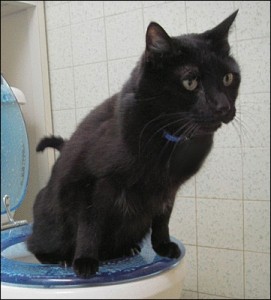Fecal Transplant: Better Than Probiotics

This month’s blog is about using poop in a very unusual way…medicine.
Yup, you read it right…Poop as medicine. The medicinal term is Micro-Biome Restoration Therapy (MBRT), or Fecal Transplantation. It involves giving an unhealthy person (or, animal) the micro-biome rich poop from a healthy person (or, animal) in order to restore and modify the micro-biome in the gut.
What happens in our guts is important to our immune system (including the brain’s immune system). Our gut is made up of bugs, define as bacteria, viruses, and fungal micro-organisms that play a vital role in maintaining the health of humans and animals. The human body has approximately 100 trillion microbes from the tip of the nose and down to the end of the anus. Basically, we have ten-times the number of microbes than we have cells, which amounts to about 2 to 5-lbs. of 1000 different species of micro-organisms with ten of thousands subspecies that have not even been identified. Our gut is a huge mystery. And, learning what each of these microbes do, what they actually secrete, how they interrelate to other microbes, may allow us to understand why we get sick and how some people never get ill.
For years, researchers have said 70% to 85% of our immune system is in our gut. But how does that work? Well, one possible way is: A research team from the National Institute of Allergy & Infectious Diseases had “examined the relationship between helpful bacteria, immune cells, and epithelial cells—cells that line the gut and absorb and process nutrients from food. The researchers observed that epithelial cells transition from a metabolic role to a protective role when immune cells are absent, suggesting that a healthy intestinal tract may rely upon a three-way conversation between immune cells, helpful bacteria, and epithelial cells. The team’s findings appear in the November 20 issue of Nature Medicine.” The study showed that even if the immune B-cells were missing in the gut, the epithelial cells would change into microbe-fighting molecules. BUT if the friendly bacteria in the gut were also missing then the genes for the immune system did not turn on.
A healthy gut is a healthy immune system is a healthy brain.
“In a stunning discovery that overturns decades of textbook teaching, researchers have determined that the brain is directly connected to the immune system by vessels previously thought not to exist. The discovery could have profound implications for diseases from autism to Alzheimer’s to multiple sclerosis.” ~ Science News, June 2015
In a world of antibiotics, glyphosate, and GMO food, many people’s guts are out of balance. It is not enough to eat fermented foods or take soil-based probiotics because you’re only going to get 7 to 20 species of gut micro-organisms. However, with a fecal transplantation you’ll receive 5000 species, plus all the thousands of subspecies. And it may be that one or two subspecies, or the other 980 species, that could hold the key to a person’s health recovery.
Another thing I should mention is that after you have taken a bout of antibiotics, and thus, have wiped out your gut flora, studies have shown it could take up to one or two years to re-establish the balance of micro-biome in the gut. In addition, antibiotics can also cause some bacteria to become antibiotic resistant, even if you have only taken antibiotics just once in your life. (See story HERE).
Feces as medicine is not a new idea.
During the Ming Dynasty, the Chinese doctors would prepare a fermented fecal concoction called “yellow soup” to treat digestive issues.
In the 1950s, Professor Emeritus Tore Midtvedt, MD, PhD, from the Karolinska Institute of Sweden was asked to help a Norwegian community that was plagued with chronic infectious diarrhea. The local doctors had tried every possible treatment, but with no success. Dr. Midtvedt decided to try MBRT. After a frustrating search for an ideal donor he finally was able to give fecal enemas to the infected patients. Within a short period of time, the diarrhea was resolved in all patients.
In the 17th Century, the German doctor, Christian Franz Psullini, complied a stool recipe book for treating dysentery and other digestive problems.
Today, fecal transplantation is still being used. It has shown an approximate 93% success rate in the treatment of clostridium difficile (C.diff), a debilitating and infectious condition of chronic diarrhea. However, because the FDA can’t patent feces they have only allowed fecal transplant therapy for C. diff patients. But, research still continues on whether MBRT can be helpful for other conditions. Such as, Chronic Fatigue Syndrome, obesity, and autism. Hopefully, in the near future, the FDA will develop clear guidelines and a MBRT protocol based on research so that it will be more available for the public and other health conditions.
Fecal Transplant Therapy for Animals

Humans aside, fecal transplantation therapy has been used for years to help sick horses, cows, and pigs.
Recently, I took a class in Fecal Transplantation for cats and dogs. In the class, Dr. Margo Roman, DVM, discussed the 850 cats and dogs she has treated successfully using this therapy. Some of the conditions that may benefit from MBRT are cancer, behavioral problems, skin issues, IBD, kidney or liver failure, allergies, etc.
Recently, fecal transplants are also being used for puppies with parvo infections with promising success. (See Study).
Since it is said that 85% of our immune system is in our gut, I look at it this way: with a Fecal Transplant you are basically transferring the ‘strong, healthy immune system’ from one body into the body of someone who has a ‘weak, debilitated immune system’ so that healing can begin. I can see how this therapy can be useful for an animal whose gut flora, hence, the immune system, has been wiped out by either chemotherapy or antibiotics.
There are two ways to administer it: orally or rectally (enemas). Since poop eating, or copraphagia, is normal for dogs it shouldn’t be that difficult to pop a poop-pill in their mouths. It’s been long speculated that dogs eat poop because they are seeking out probiotics, or some friendly microbes. However, it should be the right poop from the right dog to really receive the benefits.
And, the right dog is a healthy dog.
The biggest challenge is to find the right donor. And what’s the criteria for a perfect fecal donor? Well, this would be a dog or a cat that is fed a species appropriate diet, no GMO food, no history of antibiotics, no history of vaccines, no history of chemical flea/tick meds, no heartworm meds, drinks non-fluoridated, chemical-free pure water, is either sexually intact or wasn’t spayed/neutered until at least 2 years of age, and gets plenty of fresh air and exercise. In other words, a naturally raised healthy animal. In addition, the donor animal would be checked for a wide variety of friendly bacteria.
P.S. I’m glad to say my three cats fit the donor profile. I’m sure Snaggle will be very happy to donate his poop to any sick kitty that may benefit from a fecal transplant.
Sources: In the Gut, Body Cells Protect When Immune Cells Are Absent
Missing Link found between brain, immune system; major disease implications










